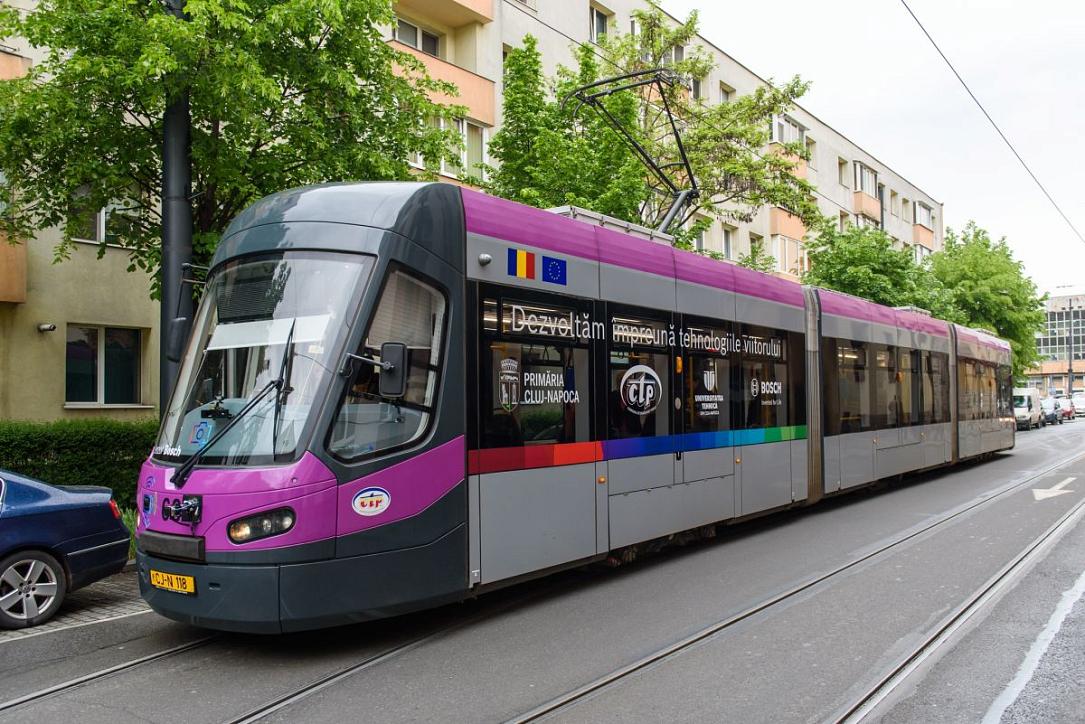Bosch Engineering installs new collision warning system on tram in Cluj-Napoca



The Bosch Engineering Center in Cluj recently announced the installation of a collision warning system developed by Bosch called Tram Forward Collision Warning (TFCW) on a tram that is part of the fleet of the Cluj-Napoca Public Transport Company (CTP).
The system assists tram drivers in critical situations by providing audible and visual warnings, thus enhancing safety for tram drivers, passengers, and other traffic participants. The local project, developed by the Bosch Engineering Center in Cluj in collaboration with the Cluj-Napoca Public Transport Company, the Technical University of Cluj-Napoca, and the Cluj-Napoca City Hall, has entered the first phase of implementation.
The tram collision warning system supports drivers in critical situations by warning them in a timely fashion about obstacles on the tracks, especially in conditions of congested traffic or reduced visibility. This allows drivers to avoid accidents or significantly reduce damage.
The tram equipped with the latest version of the TFCW 2.0 collision avoidance system will function as a laboratory for the development of future generations of the system, also being used for research and development purposes.
"We have the honor and opportunity to implement a state-of-the-art technical solution for the benefit and safety of the Cluj-Napoca community," said Mihai Boldijar, general director of Robert Bosch and representative of the Bosch Group in Romania.
"This project is the result of a partnership between the academic environment, local public authorities, and the Bosch Engineering Center in Cluj, which made this pilot project possible," continued Boldijar.
Consisting of a multifunctional camera, a radar sensor, and a control unit, the system monitors the trajectory ahead and any potential obstacles in real time. Its operation can be extended to automatically apply the service brake if the tram driver responds too late or does not respond at all to the system's warning. However, this feature is not activated for this tram, and the tram driver remains in control.
"The future of innovation in the European Union is also being written in Cluj. Through exceptional collaboration within the local innovation ecosystem, we manage to produce cutting-edge safety systems. And we won’t stop here. We continue to be a laboratory for generating innovative ideas and solutions that improve people's lives. Cluj City Hall has been and will always be close to you in supporting projects that generate added value and consolidate the direction of our city's transition from 'Made in Cluj-Napoca' to 'Invented in Cluj-Napoca'," said Emil Boc, mayor of Cluj-Napoca.
The warning system was developed by Bosch Engineering GmbH, a subsidiary of Robert Bosch GmbH, represented in Romania by the Bosch Engineering Center in Cluj. It makes use of a technology similar to that used in the automotive industry, specifically advanced driver assistance technologies.
Combining data from the multifunctional camera and the medium-range radar sensor enhances obstacle detection and minimizes the effects of weather conditions. The sensor fusion principle, adopted from the development of automated vehicles, combines the strengths of multiple sensor types, increasing the reliability and performance of the system. This is how Bosch Engineering reduces the risk of accidents and ensures greater safety and efficiency in public transportation.
Currently, the Bosch system warns the tram driver of imminent frontal collisions, and work is underway to expand its functionality and improve performance.
The global team responsible for developing such solutions for rail transportation includes over 20 programmers from Cluj-Napoca, employed by the Engineering Center.
"An important aspect to mention is that each city has its specific model of trams and local routes, which is why the TFCW system needs to be tested and adapted to each city and tram individually. When implementing the technology in a new city, we start by conducting multiple calibration rounds to study the routes and the surrounding environment. This is where the expertise of local Bosch engineers comes into play, as they adapt the software to the local specifics, in this case, for the routes in Cluj-Napoca," said Tobias Matter, director of the Bosch Engineering Center in Cluj.
The TFCW system is already successfully deployed in over 1500 trams in several cities in the US, Australia, Germany, Netherlands, Czech Republic, and Hungary.
The first pilot project for active assistance in trams in Romania was implemented in September 2021 by the Bosch Engineering Center in partnership with the Bucharest Public Transport Company, and a second pilot project operated in Oradea at the end of 2022.
(Photo source: Bosch)